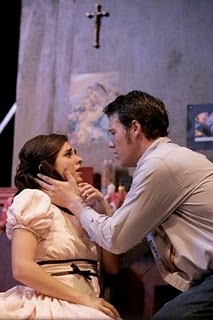 |
| Cleaning up after actors. Back row: Hana Kadoyama (Stage Manager). Front row (L-R): Emma Jimerson (ASM) and Zoe Travis (ASM). |
What does the Stage Manager do?
What doesn’t the stage manager do? That might be a more accurate question! The stage manager is there throughout the whole process of mounting a show, from the first design meetings through the last performance. Theatre is inherently collaborative, and I like to think of all the teams working on a show as different spokes of a wheel: the director, actors, all the designers, the technicians, publicity, playwright (on a new show), etc. If all the different people working on the show are the spokes, the stage manager is the organizational hub of that wheel, facilitating communication among everyone. Basically, it’s the SM’s job to know everything that’s going on, all the time! When the show opens, the stage manager is the one who runs the whole shebang, calling all the light and sound (and video, etc.) cues throughout the show. And that’s not all of it…it’s so hard to explain!
What does the ASM do?
Even though they’re called “assistants,” assistant stage managers have their own responsibilities and are totally in charge of their own worlds in rehearsals and shows. ASMs are in charge of tracking props and staying on book during rehearsals; once the show opens, the stage manager runs the show from the booth (light/sound cues) and the ASMs are backstage running the show from there and dealing with the real-life crises that occur backstage on a daily basis!
Walk us through the day in the life of the SM Team during a typical rehearsal?
Some Mother’s Son has a ton of very specific prop moments, so a lot of the pre-show focus is on making sure every single prop, set piece and costume piece is preset in exactly the right place! During rehearsals before tech, the SM takes blocking notes while the ASMs are on book, making sure the actors get their lines right. Now that we’re in tech, we’re working like we would during a show: Hana calling the show from the tech tables in the house, and Emma and Zoe rocking it backstage!
Why stage managing?
Nothing makes me feel closer or more essential to the artistic process of making theatre. Plus, calling a show is the best feeling ever—the held breath before the “GO,” the adrenalin when that instinct comes in just the right place and you see that light cue or hear that sound and you know that this moment of theatre magic came from the designers and through you to that perfectly timed moment playing out onstage.”
What's something very few actors know about the stage manager's role?
We’ve got your back! An awesome stage manager once told me that there’s a reason actors and stage managers are in the same union: they’re the only ones who see a show all the way through its final performances. The designers and director may leave, but it’s up to the actors and SM to keep putting a good show out there onstage every night. We’re in this together, man!
How and why did you get involved with Some Mother's Son?
I’ve been involved in stage management at Smith since my first year, and when I met Kendra last year and found out she was directing this show, I knew I wanted to work with her. I read the script and was hooked—working on a new play has been a really exciting and eye-opening process as well.
What has surprised, inspired, excited, and/or challenged you most throughout the process thus far?
I have a friend who says that she does theatre because there’s no way to perfect it; every show, every day is different every time you do it. I’m a stage manager because I’m constantly surprised, inspired, excited, and challenged simply by the process of making theatre.
What are the joys and/or challenges of SMing in Hallie Flanagan Studio Theatre?
I love working in blackbox theatres, and this one especially has a spirit that constantly reminds me how lucky I am to be doing this.
Earliest memory of theatre?
Fourth grade, on the tire swing with my friend Katherine as she sang songs from the after-school play she was in. I jumped off the tire swing and into the theatre and never left, I guess.
Why is theatre necessary?
Anything that gives humans a positive, creative way to connect and communicate with other humans is necessary.What's next?
I'm headed to Oregon Shakespeare Festival in Ashland, Oregon on a summer fellowship!



































